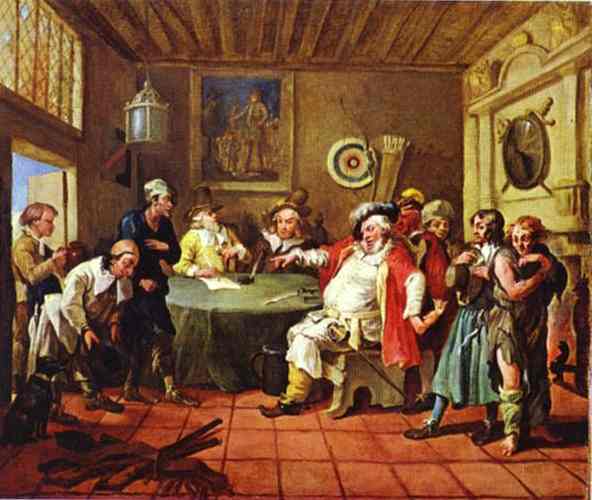Monday
Professor of Strategic Studies Phillips P. O’Brien, whose tweets on the Russo-Ukrainian War I’ve been following, yesterday described Russia’s mass mobilization as “the worst mobilization process in modern history.” Even as Russians with money and connections flee the country, ethnic minorities are seeing their communities raided for young men. There has been some resistance, and one can find video footage of villagers fighting against the police as their sons are loaded onto buses. Apparently some that are being conscripted (this according to the Washington Post) are “elderly, sick, disabled or otherwise unfit or exempt from military service.”
We might call the mobilization Falstaffian in that it brings to mind Falstaff’s corrupt enlistment of troops in Henry IV, Parts I & II.
Because of his close connection with Prince Hal, Falstaff has been given the power to press men into service to fight against the rebels. Exhibiting a corruption that would be familiar to the Russian army, Falstaff confesses to “misus[ing] the king’s press damnably.” Since in England at the time, as in modern day Russia, one could buy oneself out of service, Falstaff drafts men from wealthy families, who then pay him to be excused:
If I be not ashamed of my soldiers, I am a soused gurnet. I have misused the king’s press damnably. I have got, in exchange of a hundred and fifty soldiers, three hundred and odd pounds. I press me none but good householders, yeoman’s sons…; such a commodity of warm slaves, as had as lieve hear the devil as a drum; such as fear the report of a caliver [handgun] worse than a struck fowl or a hurt wild-duck. I pressed me none but such toasts-and-butter, with hearts in their bellies no bigger than pins’ heads, and they have bought out their services…
Falstaff pockets the money and then proceeds to fill his ranks with those who can’t afford his fees. From what we’re hearing of Russia’s mobilization, some of the new draftees don’t sound much better than Falstaff’s recruits. Certainly they have no training for the kind of war they are about to enter:
…and now my whole charge consists of ancients, corporals, lieutenants, gentlemen of companies, slaves as ragged as Lazarus in the painted cloth, where the glutton’s dogs licked his sores [see yesterday’s post for this reference]; and such as indeed were never soldiers, but discarded unjust serving-men, younger sons to younger brothers, revolted tapsters and ostlers trade-fallen, the cankers of a calm world and a
long peace, ten times more dishonorable ragged than an old faced ancient: and such have I, to fill up the rooms of them that have bought out their services, that you would think that I had a hundred and fifty tattered prodigals lately come from swine-keeping, from eating draff and husks. A mad fellow met me on the way and told me I had unloaded all the gibbets and pressed the dead bodies. No eye hath seen such scarecrows.
Prince Hal is taken aback when he encounters Falstaff’s troop, remarking, “I did never see such pitiful rascals.” Falstaff’s reply is existentially profound. When it comes to dying, he says, they’ll do as well as anyone:
Tut, tut; good enough to toss; food for powder, food for powder; they’ll fill a pit as well as better: tush, man, mortal men, mortal men.
We have more recruiting scenes in Henry IV, Part II, and in this play they have names and personalities. Falstaff must choose two from amongst Mouldy, Shadow, Wart, Feeble and Bullcalf. Mouldy and Bullcalf, although more fit, escape through bribes. (They are the two figures on the right in Hogarth’s painting above; you can see them delivering the money into Falstaff’s hand.) Falstaff’s chooses Shadow and effeminate Feeble because he thinks they will prove better at escape:
And this same half-faced fellow, Shadow; give me this man: he presents no mark to the enemy; the foeman may with as great aim level at the edge of a penknife. And for a retreat; how swiftly will this Feeble the woman’s tailor run off! O, give me the spare men, and spare me the great ones.
The current version of “food for powder” is “cannon fodder,” a future I’ve heard predicted numerous times for Russia’s new draftees. With virtually no training or logistical support, and some being assigned rusty AK-47s and bolt-action rifles used by the USSR in World War II, they will prove no match for the better armed, better led, and better motivated Ukrainians. It may well be that they should model themselves on Shadow and Feeble if they want to avoid swelling Russia’s casualty figures, which the Pentagon has estimated number between 70-80,000.
O’Brien says that the Russians are still thinking of World War II, when, in the end, sheer numbers of Soviets overwhelmed the Germans. This, however, is not that kind of war. He also figures that the 300,000 reservists that Russia is calling up “won’t matter that much.”
Fortunately for Prince Hal, he does not need Falstaff’s men, winning glory on his own. But that too is not this kind of war.


